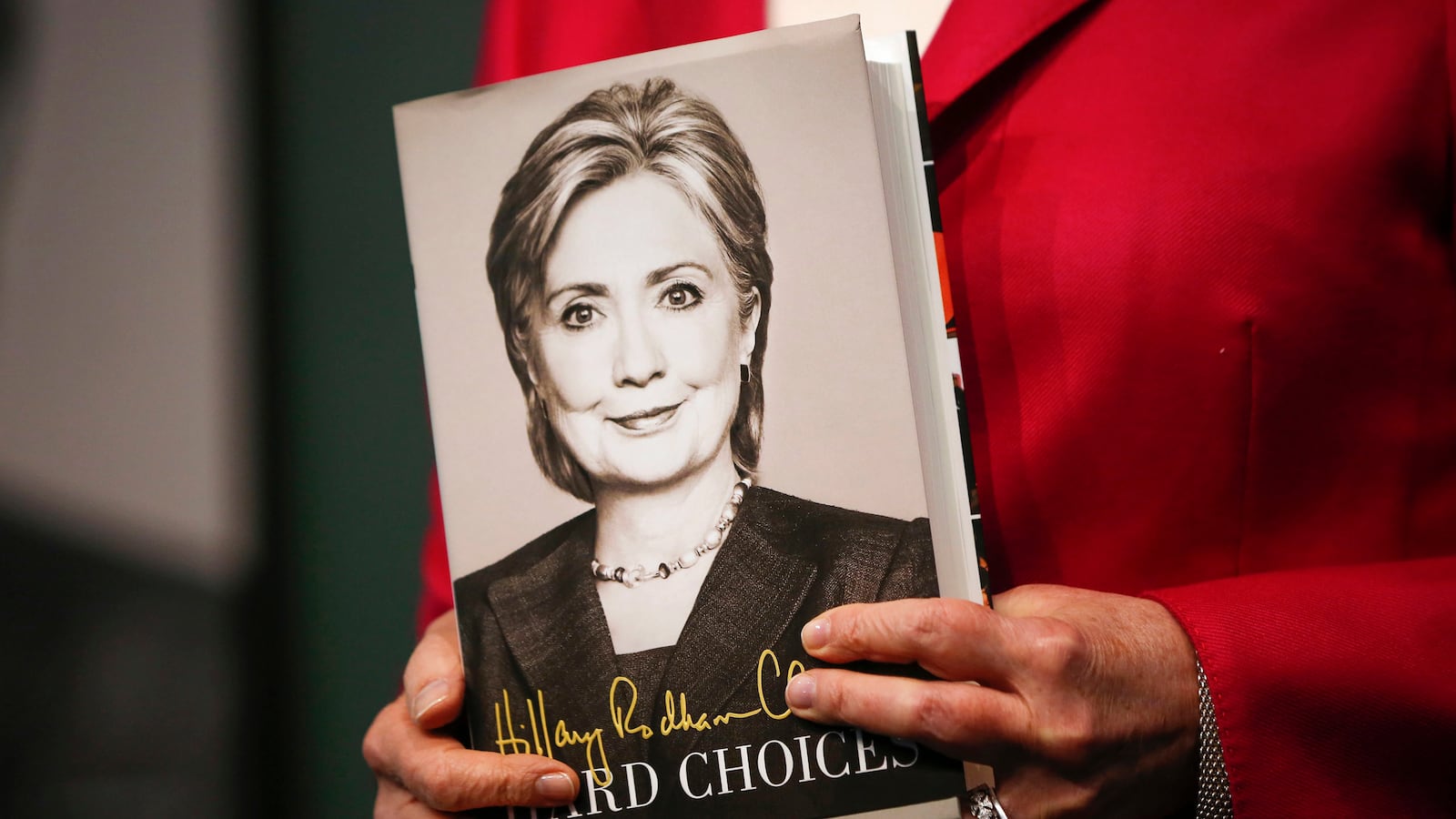Did you hear? Hillary Clinton released a book last week. You may have missed it, being that Hillary’s exposure was limited to the cover of several national magazines, the focus of dozens of national news broadcasts, and the subject of a town hall meeting (with its very own URL!). Not to mention that if you happened to trek into your local bookstore or browse your favorite e-reading device, Hillary’s new book was given prime bookstore real estate, lining stepladders by the dozen, the subject of numerous email blasts and banner ads. Hard Choices was the recipient of a rollout the likes of which are unheralded outside of presidential memoirs or new Twilight novels. But how did Hard Choices do amidst this mass media onslaught? And are its sales a harbinger of its candidate’s political future?
Some outlets, such as The Weekly Standard, have already declared the book a bomb, based on very limited sales data, extrapolated based on ideology. However, with a fuller sales picture now painted for the first week Hard Choices was on sale, we can begin to parse the data fully and better understand its implications.
A quick note for publishing neophytes: the data discussed here is taken from Nielsen Bookscan, the publishing industry’s primary sales tracker. It represents approximately 70-80 percent of print sales, but 0 percent of digital sales (which do not report to Bookscan). That data is available only to publishers through their vendors and is proprietary unless released to the public. So this data, while representing the most comprehensive look at Clinton’s book sales—as well as that of other books discussed—does not represent the entire picture, just the best figures currently available.
Let’s start off with some context. Hillary Clinton’s first memoir, Living History, was published in June 2003. It sold a remarkable 1,150,000+ copies as recorded by Bookscan, including whopping first week sales of 438,000+ copies. In 2003 there was no ebook market, so the print edition was responsible for all book sales at that time. Living History made news not just for its author and subject matter but due to Clinton’s reported $8 million advance, one of the largest paid to an author in history—the other recipients were either presidents, popes, or J.K. Rowling. Despite this, Clinton’s book exceeded expectations and was a solid commercial success. Approximating 1.5+ million copies sold (the Bookscan figure representing 60-70 percent of the market in 2003), and Simon and Schuster receiving $14 per $28 hardcover, Living History grossed more than $21 million. Adding paperback sales of approximately 300,000 copies, plus ebook sales once Living History was available in that format later in the decade, and even factoring in publicity and marketing costs likely in the hundreds of thousands (if not millions), Living History made its publisher a hefty profit.
Eleven years later, Hard Choices was released with the fanfare of a presidential (candidate) memoir, another massive marketing budget, and an increased price: $35 for the 600-plus page hardcover. Based on its first week Bookscan numbers, the commercial reception for Hard Choices has been decidedly underwhelming: in its first week it sold just 85,721 print copies, compared to the 500k+ of Living History, and fewer than the week’s bestselling fiction title, Written In My Heart’s Own Blood, the latest ‘Outlander’ novel from Diana Gabaldon, which sold 88,751 copies (with no town hall). Taking into account digital sales and Bookscan’s 70-80 percent market coverage, Hard Choices likely sold between 110,000-140,000 copies. Massive for just about any author—not so much for a Clinton memoir.
So what does this mean for potential presidential candidate Hillary Clinton? It can be examined from two perspectives.
First: Clinton’s underwhelming book sales are a prism through which we can view the country’s waning love for Hillary’s potential candidacy and perhaps even herself as a political figure at large. If people couldn’t be convinced to go to their local bookstore or download a copy, why would they be eager to vote for her in 2016?
Second: Despite the poor sales compared to her first memoir, Hillary remains a viable candidate primarily because expectations are simply far higher for her than other candidates. And while sales of Hard Choices pale in comparison to Hillary’s previous book, it still far outsold recent political candidacy books and is a far more successful follow-up than second titles by political celebrities like Sarah Palin and her own husband.
The best-selling political books of the past decade:
Decision Points by George W. Bush: 1,900,000+ copies
Going Rogue by Sarah Palin: 1,393,000+ copies
My Life by Bill Clinton: 1,279,000+ copies
Living History by Hillary Clinton: 1,150,000+
Both the Palin and Bush books were released as the ebook market was expanding, so their sales figures would be even higher than the Clintons’, whose books were not available as ebooks upon initial publication.
However if you compare Hard Choices to other recent potential candidates—both Bush and Clinton published their books after leaving the Oval Office—Hard Choices fares better.
No Apology by Mitt Romney: 100,000+ copies (42,000+ first week)
Fed Up by Rick Perry: 27,000+ copies (3,300+ first week)
Promises To Keep by Joe Biden: 30,000+ copies (1,400 first week)
This Is Herman Cain! by Herman Cain: 33,000+ copies (12,000+ first week)
It also fares well when compared to follow-up books by authors whose first titles were mega best-sellers:
Giving by Bill Clinton: 216,000+ copies (47,000+ first week)
America By Heart by Sarah Palin: 286,000 copies (57,000+ copies first week)
While Clinton’s book clearly underperformed based on her and the media’s expectations, she clearly still has more drawing power (and bookselling power) than the majority of other candidates in both parties—Hard Choices sold nearly as many copies in its first week as Cain, Biden, and Perry’s books did in their entire lifespan.
So why the (relatively) lackluster sales? This can probably be ascribed to several reasons:
1) Clinton fatigue. Hillary has been in our lives politically for a quarter century, and even if people might be willing to vote for her for president in 2016, they don’t feel the need to contribute more money to her already large bank account by purchasing a book.
2) Benghazi. Despite the positive achievements Hillary recalls in Hard Choices during her time as secretary of State, it is still the attack on the American consulate in Benghazi that has resonated most with the American public. Even her staunchest supporters admit that her office failed when it came to protecting the lives of Christopher Stevens, Sean Smith, Tyrone Woods, and Glen Doherty. The fanfare surrounding Hard Choices galls some as a celebration of a failed tenure in office that resulted in four preventable deaths.
3) Lack of Monica. Though the Clintons rolled their eyes when Monica Lewinsky’s Vanity Fair piece was published ahead of Hillary’s book, both Hillary and Bill’s first memoirs sold in part due to the Lewinsky affair being addressed for the first time in print. My Life and Living History hit the perfect intersection of news and gossip, and people who salivate for both bought those books. In Hard Choices, there have been few newsworthy or gossip-worthy tidbits that have leaked, other than Hillary rebuffing then-candidate Barack Obama’s directive to attack Sarah Palin in 2008. This anecdote is hardly the thing to drive book sales, since there tends to be little overlap in the Venn diagram between Hillary supporters and Palin supporters.
4) Transparency. Though she has yet to officially declare, Hard Choices was released with the full-on media blitz expected from presidential candidates named Clinton. Hillary was everywhere, from news shows to bookstore signings to People magazine. Many people feel that Hard Choices is merely a tool to help sell the public on candidate Hillary Clinton, and again whereas people may still vote for her, they didn’t feel the need to spend $35 to be a part of the campaign—er, book launch.
The fact is, we can only speculate on Hillary Clinton’s fortunes in the 2016 elections, should she run. Many other factors would come into play, including the competency and platforms of her opponents, both Democrat and Republican. But if Hillary hoped her book sales would be a harbinger for an effortless campaign with supporters literally buying every word she says or writes, the hard numbers available so far suggest that it will likely be a rockier road than Team Hillary expected.






